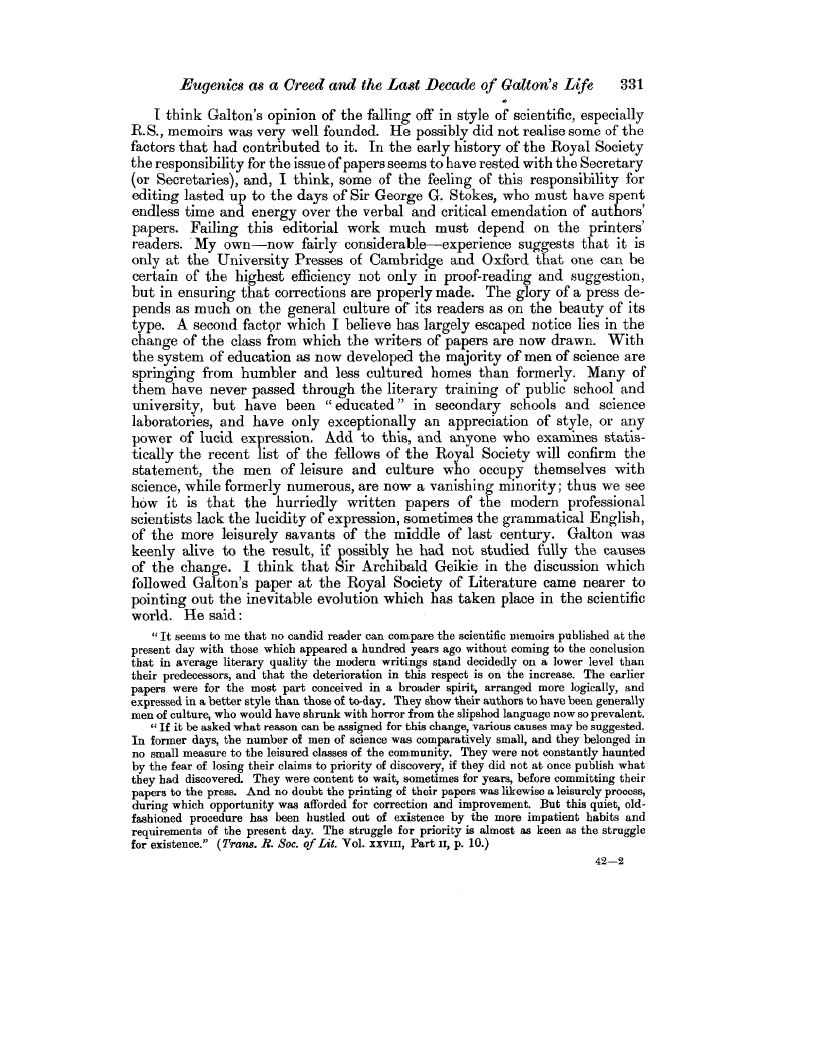| ||||||

OCR Rendition - approximate
Eugenics as a Creed and the Last Decade of Galton's Life 331 I think Galton's opinion of the falling off in style of scientific, especially R. S., memoirs was very well founded. He possibly did not realise some of the factors that had contributed to it. In the early history of the Royal Society the responsibility for the issue of papers seems to have rested with the Secretary (or Secretaries), and, I think, some of the feeling of this responsibility for editing lasted up to the days of Sir George G. Stokes, who must have spent endless time and energy over the verbal and critical emendation of authors' papers. Failing this editorial work much must depend on the printers' readers. My own-now fairly considerable-experience suggests that it is only at the University Presses of Cambridge and Oxford that one can be certain of the highest efficiency not only in proof-reading and suggestion, but in ensuring that corrections are properly made. The glory of a press depends as much on the general culture of its readers as on the beauty of its type. A second factor which I believe has largely escaped notice lies in the change of the class from which the writers of papers are now drawn. With the system of education as now developed the majority of men of science are springing from humbler and less cultured homes than formerly. Many of them have never passed through the literary training of public school and university, but have been " educated " in secondary schools and science laboratories, and have only exceptionally an appreciation of style, or any power of lucid expression. Add to this, and anyone who examines statistically the recent list of the fellows of the Royal Society will confirm the statement, the men of leisure and culture who occupy themselves with science, while formerly numerous, are now a vanishing minority; thus we see how it is that the hurriedly written papers of the modern professional scientists lack the lucidity of expression, sometimes the grammatical English, of the more leisurely savants of the middle of last century. Galton was keenly alive to the result, if possibly he had not studied fully the causes of the change. I think that Sir Archibald Geikie in the discussion which followed Galton's paper at the Royal Society of Literature came nearer to pointing out the inevitable evolution which has taken place in the scientific world. He said '° It seems to me that no candid reader can compare the scientific memoirs published at the present day with those which appeared a hundred years ago without coming to the conclusion that in average literary quality the modern writings stand decidedly on a lower level than their predecessors, and that the deterioration in this respect is on the increase. The earlier papers were for the most part conceived in a broader spirit, arranged more logically, and expressed in a better style than those of to-day. They show their authors to have been generally men of culture, who would have shrunk with horror from the slipshod language now so prevalent, " If it be asked what reason can be assigned for this change, various causes may be suggested. In former days, the number of men of science was comparatively small, and they belonged in no small measure to the leisured classes of the community. They were not constantly haunted by the fear of losing their claims to priority of discovery, if they did not at once publish what they had discovered. They were content to wait, sometimes for years, before committing their papers to the press. And no doubt the printing of their papers was likewise a leisurely process, during which opportunity was afforded for correction and improvement. But this quiet, oldfashioned procedure has been hustled out of existence by the more impatient habits and requirements of the present day. The struggle for priority is almost as keen as the struggle for existence." (Trans. R. Soc. of Lit. Vol. xxvui, Part ii, p. 10.) 42-2
|